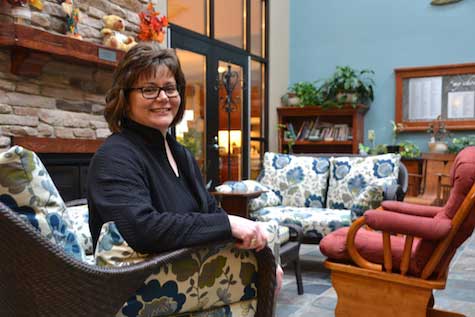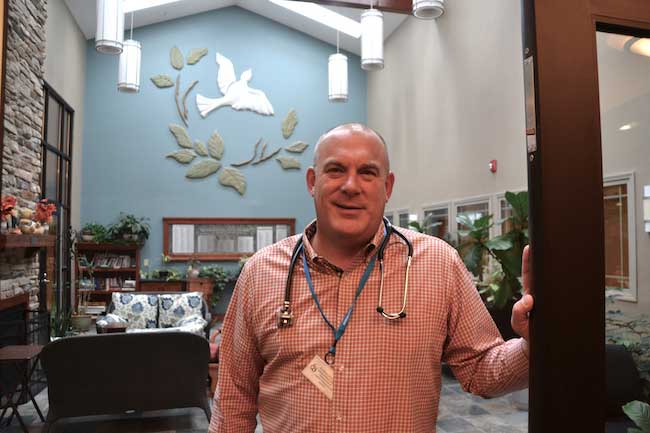Hospice expands mission to supportive care
Agency is serving people who don’t have a terminal illness
ALBION – Hospice of Orleans isn’t an organization that will only help patients with a terminal illness.
The agency has expanded its mission – and its name. It’s now Supportive Care & Hospice of Orleans.
“We support people through their illnesses,” said Kellie Spychalski, the executive director.
Hospice can provide care that is funded through Medicare if someone has been diagnosed with a terminal illness, with six months or less to live.
Hospice patients receive care in their house, at a nursing home or at the Martin-Linsin Residence in Albion, behind the Hospice administrative offices on Route 31.
However, that leaves out a lot of people who don’t have a terminal illness but are suffering from symptoms and stress from serious illnesses such as cancer, heart failure, COPD, kidney disease, dementia and other conditions.

Kellie Spychalski, executive director for Supportive Care & Hospice of Orleans, said the organization wants to assist people suffering from symptoms and stress of serious illnesses, but aren’t considered to have a terminal illness.
Hospice has expanded its work to serve people with chronic illnesses that aren’t terminal.
“We look at what they need and want,” Spychalski said. “What we do is support people.”
Hospice hired a new medical director in April, and Dr. Andrew Esch is a strong advocate of palliative care. He believes in the collaborative approach through hospice, where a patient’s medical team talks to each other directly and is focused on helping a person live as comfortably as possible.
“Hospices are leading the way in providing palliative care,” he said.
Esch, a Buffalo resident, works for Hospice of Orleans on Tuesdays, visiting patients at their homes, the Martin-Linsin Residence or nursing homes. He speaks with their families, nurses and doctors.
“The hospice model works well with a team of people working on your needs,” he said.
Esch is a palliative care consultant with the Center to Advance Palliative Care in New York City. He helps hospices and healthcare systems set up palliative care systems to support patients.
He said healthcare is “a messy system” where the sickest people are expected to leave their homes to get care in hospitals or healthcare facilities.
Hospice also provides care to people who are seriously ill. The people who are “in between,” who are battling chronic illnesses, can feel left out for managing their symptoms. That’s why Esch has become so determined to expand palliative care and to see patients himself.
The local hospice is expanding supportive care even though there is little reimbursement for the work. Spychalski said the organization is fortunate to have a generous community that backs the agency, allowing it to send nurses and staff to see patients for palliative care.
“It’s the right thing to do,” she said.
Hospice also has a transitions program where a social worker will visit patients who have a new diagnosis and may need medical equipment, such as a wheelchair, shower bench or other supplies that Hospice often has in its loan closet.
Spychalski said the organization is trying to spread the word that it has services for people who may “fall through the cracks” because they haven’t been diagnosed with a terminal illness.
“Hospice has a team approach and we look at the whole person,” she said. “We help with pain management and with a person’s social, spiritual and emotional needs.”
A patient’s team includes the doctor, nurses, social workers and a chaplain.
Spychalski said she is pleased with Dr. Esch and his kindness and attention to the patients.
Esch said he welcomes the chance to work directly with patients. He is impressed with the Orleans County community, and its donations that made the $2.3 million Martin-Linsin Residence possible.
The 8,500-square-foot hospice home opened in 2012 with rooms for eight residents. There is 24-hour-a-day nursing care.
“The facility is a representative of how important the community feels this organization is,” Esch said. “They’ve given us their best so we need to give them our best. Orleans County is tight-knit. They want to take care of their family, friends and neighbors.”








































































